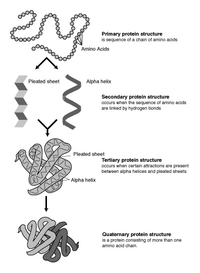
Photo from wikipedia
The accurate prediction of protein structures achieved by deep learning (DL) methods is a significant milestone and has deeply impacted structural biology. Shortly after its release, AlphaFold2 has been evaluated… Click to show full abstract
The accurate prediction of protein structures achieved by deep learning (DL) methods is a significant milestone and has deeply impacted structural biology. Shortly after its release, AlphaFold2 has been evaluated for predicting protein-peptide interactions and shown to significantly outperform RoseTTAfold as well as a conventional blind docking method: PIPER-FlexPepDock. Since then, new AlphaFold2 models, trained specifically to predict multimeric assemblies, have been released and a new ab initio folding model OmegaFold has become available. Here, we assess docking success rates for these new DL folding models and compare their performance with our state-of-the-art, focused peptide-docking software AutoDock CrankPep (ADCP). The evaluation is done using the same dataset and performance metric for all methods. We show that, for a set of 99 nonredundant protein-peptide complexes, the new AlphaFold2 model outperforms other Deep Learning approaches and achieves remarkable docking success rates for peptides. While the docking success rate of ADCP is more modest when considering the top-ranking solution only, it samples correct solutions for around 62% of the complexes. Interestingly, different methods succeed on different complexes, and we describe a consensus docking approach using ADCP and AlphaFold2, which achieves a remarkable 60% for the top-ranking results and 66% for the top 5 results for this set of 99 protein-peptide complexes.
Journal Title: Journal of chemical information and modeling
Year Published: 2023
Link to full text (if available)
Share on Social Media: Sign Up to like & get
recommendations!